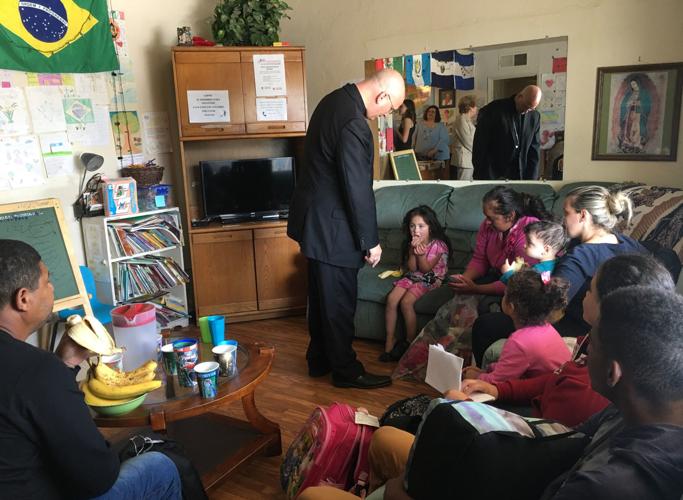While Sister Donna Markham had seen images of children and their parents waiting outside the Nogales port of entry, the reality was 10 times more painful, she said.
“This is the first time I see people sitting outside lined up at a border like that, sitting in the heat and waiting to be tended to,” said Markham, chief executive officer and president of Catholic Charities USA, as her eyes welled with tears. “That was pretty shocking for me. And to be with people and to know how frightened they are, they don’t know what’s going to happen to them.”
Markham was in Tucson Thursday as part of a Southern Arizona visit that included talking with officials of the binational organization Kino Border Initiative in Nogales and meeting with families lined up outside the pedestrian area of the port of entry waiting for Customs and Border Protection officers to process them.
She also visited Casa Alitas, a local shelter of Catholic Community Services, where families arrived after being released by immigration officials — including some of those processed at the port of entry.
Since mid-May, the line of people, mostly from Central America and Mexico, waiting to seek asylum in the United States has continued to grow at the Nogales port of entry as the government processes a few families at a time.
As the wait for families grew from days to up to weeks, Kino Border Initiative and others organized to send families to one of five shelters set up so they could sleep, bathe and eat away from the triple-digit weather and in more sanitary conditions. Volunteers feed the families daily while others visit to give the children toys and diapers.
At the same time, in order to address the growing number of parents coming to the U.S. with their children, the Trump administration implemented a “zero-tolerance” policy. The goal was to refer for prosecution everyone who crossed the border without authorization — regardless of whether they were traveling with minor children or seeking asylum. Because children aren’t being criminally charged and can’t be held in detention with the parents as they go through their legal proceedings, officials said they had to separate the minors from their parents.
A judge has set July 26 as the deadline to reunite some 3,000 minors and their parents still separated. Officials have not said how many of those are in Arizona or are people who crossed through here.
The government is working through groups like Catholic Charities and Lutheran Immigration and Refugee Services across the country to assist with these families as the Trump administration tries to meet the deadline.
“While Catholic Charities is very much saddened by this whole situation of breaking up families,” Markham said, “we are willing to do whatever we can to at least heal the families that have been broken.”
In Tucson, at least 57 parents were separated from at least 61 children since mid-May through prosecutions in Operation Streamline, a fast-track program for people who cross the border illegally, according to an ongoing review of court records by the Arizona Daily Star.
The children of parents being prosecuted were sent to shelters run by the federal Office of Refugee Resettlement, including several in the Tucson area, where case managers work with them to find a sponsor who can take them in — usually a parent, relative or close friend.
Amid growing pressure, President Trump instructed federal agencies on June 20 to keep families together in detention after the parents are arrested for crossing the border illegally.
So far, there have been issues with finding some of the parents, especially those who have been deported. Shelter workers received reunification guidance earlier this week that included: do not separate siblings regardless of age; a validated birth certificate can be used to release the minor; and reunification with a sponsor is possible if a detained parent is in agreement.
The guidance also said parents who have criminal charges are not subject to the court order and reunification is not mandatory, according to the list provided to the Star. The examples used involved a parent found guilty of child cruelty, narcotic or rape charges. But it is not clear if this would also include parents convicted of immigration violations since many, if not most, of those apprehended by Border Patrol were prosecuted in federal court for illegal entry, a misdemeanor.
At Casa Alitas, Markham and Catholic Diocese of Tucson Bishop Edward Weisenburger prayed with a Honduran family as they got ready to leave and snapped a picture the mother wanted workers to send her.
“Pope Francis has called on all of us to be sensitive and accompany people on the move across the world,” Markham said, “to reach out to the stranger, welcome the stranger to our homes and care for them.”





